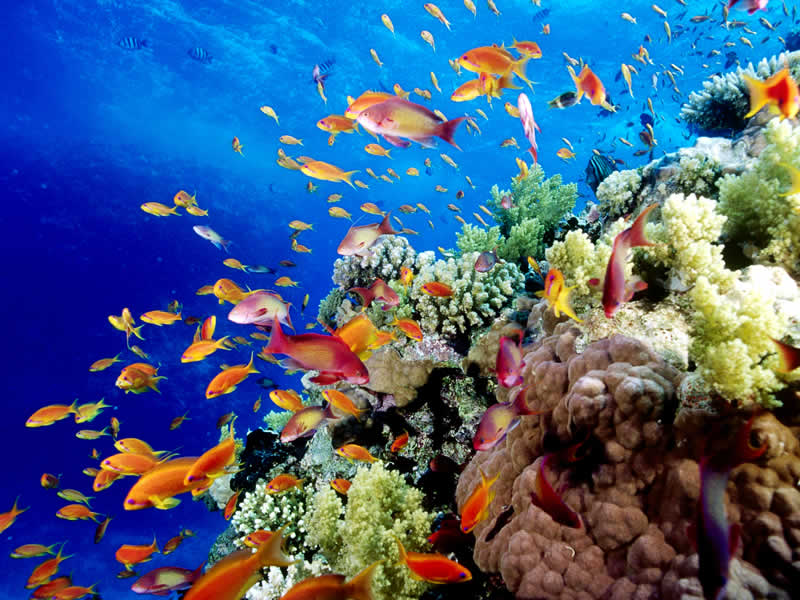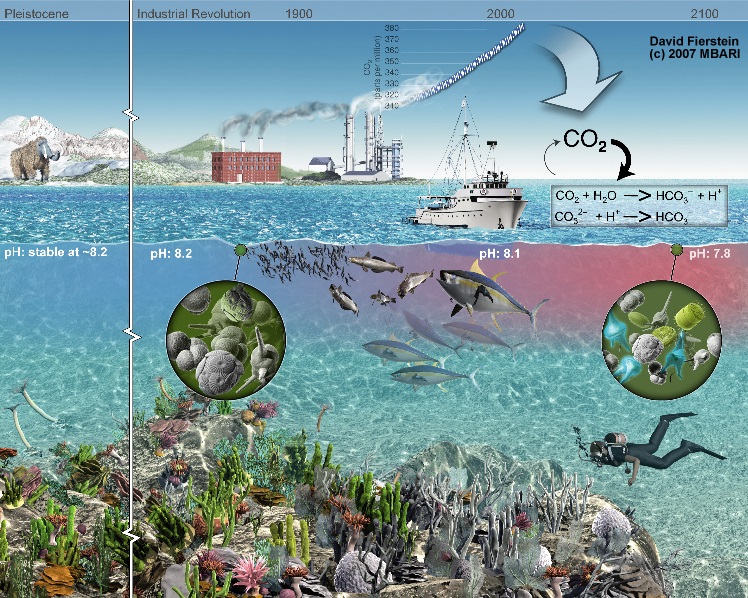Published on Aug. 2, 2014

Have you ever wondered what it would be like to see a coral reef system in person? They are very beautiful and are among some of the most biologically diverse ecosystems on planet Earth. Often called, “rainforests of the sea”, they are underwater living structures composed of calcium carbonates that over time are secreted by animals called coral polyps. Coral reefs perform photosynthesis just like terrestrial plants do; therefore, they need sufficient sunlight to give off oxygen and nutrients to surrounding aquatic life. Approximately less than 0.1% of the ocean’s floors are composed of coral reefs, yet they are home to roughly 25% of all the aquatic animals found on Earth.
Coral reefs are vital for society, not only ecologically, but also economically, but according to Marine Biologist T.P. Hughes, “Unfortunately reefs are in serious decline; an estimated 30% are already severely damaged, and close to 60% may be lost by 2030”. Scientists in the field of climate change once believed the decline to coral reefs was primarily caused by pollution, but it is now evident that reefs are affected by anthropogenic climate change. Global climate change is one of the leading causes of decline to the world’s coral reefs through coral bleaching, severe weather (i.e. sedimentation), and ocean acidification.
Coral Bleaching
To understand what coral bleaching is, one must know the basic structures of coral reefs. The coral polyps that compose coral reefs expel a special alga called zooxanthellae. This algae lives within the coral polyps and provides 80% of the energy for reefs. Recently, due to the increased ocean water temperatures from climate change, the zooxanthellae are declining and dying, thus killing coral reefs all over the world. T.J. Goreau, a leading researcher from the Global Coral Reef Alliance stated that, “Widespread evidence that coral reefs underwent episodic high temperature stress over the past decade makes bleaching a forerunner of reef ecosystem stress from ocean warming”. The reason it is called coral bleaching is because when the coral is stressed due to warmer water temperatures, the zooxanthellae are expelled and it loses its pigment, eventually becoming bleached or completely white (Figure 1).

Coral reefs can recover from the effects of coral bleaching and the algae can grow back, but only if the ocean water’s temperature returns back to where it was before climate change. Society’s recent carbon emissions into the atmosphere have decreased the ozone layer leading to increased temperatures and higher UV levels, indicating that coral bleaching is evidently a problem. Humans have to lower carbon emissions so the temperature of the oceans can decrease to give life back to reefs.
Severe Weather (Sedimentation)
Recent evidence indicates that global climate change is leading to more intense storms every year. These storms include but are not limited to tsunamis, hurricanes, and cyclones. These storms destroy the reef systems due to very high ocean currents experienced during the storms that the reefs are not used to. Although coral reefs can tolerate moderate storms, the storms that reefs have recently been exposed to are more intense and cause more damage. In addition, the runoff that the storms produce going into the ocean damage coral reefs. Sedimentation of coral reefs from runoff reduces the light penetration into the water, thereby reducing the photosynthetic activity of the coral. Human activities, such as building roads, clearing of forests, and urban development also leads to sedimentation problems. Dr. Tony Lupo a leading expert on climate change at the University of Missouri, stated that, “Climate change is affecting the ocean’s coral reefs, regardless if it is human driven or not it will still cause damage, so if we can reduce the anthropogenic activities, we can at least help fight this world-wide problem”.
Ocean Acidification
For millions of years, our world’s oceans have been maintaining a relatively steady pH level, however, since the establishment of the industrial revolution, humans have been emitting carbon dioxide into the atmosphere from the burning of fossil fuels (Figure 2).

Ocean acidification is the decrease in the pH of the world’s oceans due to anthropogenic carbon dioxide going into the atmosphere. Acidification alters seawater chemical speciation and biogeochemical cycles of many elements and compounds. One well-known effect is the lowering of calcium carbonate
saturation, which impacts shell-forming marine organisms from plankton to benthic mollusks, echinoderms, and corals. Empirical evidence suggests that if this acidification trend continues, key marine organisms—such as corals and some plankton—will have difficulty maintaining their external calcium carbonate skeletons. Approximately a third of the carbon dioxide released into the atmosphere is absorbed by the oceans, which play a huge role in moderating climate change. If it was not for the capacity of the world’s oceans, atmospheric carbon dioxide concentrations would be much higher and climate change would be much more evident.
What We Can Do
Each and every one of these environmental concerns needs to be looked at closely for preservation of coral reefs in the future. They are some beautiful ecosystems that are enjoyed by millions of people. As society we can help in many ways, for example, volunteer for a coral reef cleanup (if you live on the coast), educate others on what is happening and spread the word, and contact governmental agencies on the issue. We also have to adapt better land management practices in order to end the destruction of Earth’s coral reefs. Hopefully society can continue to educate the public on the harm we are doing to the Earth and continue to make forward strides in sustaining this world we live in so that we can always enjoy the rainforests of the sea.